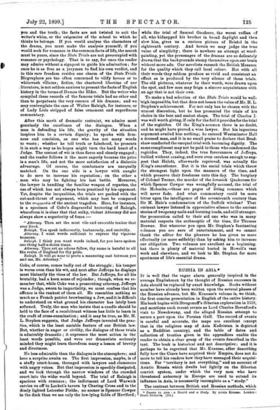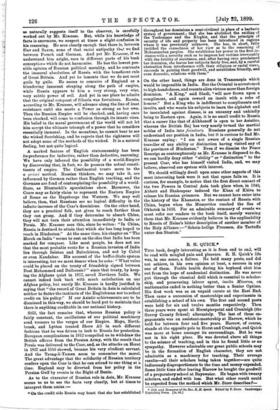RUSSIA IN ASIA.*
Jr is well that the vague alarm generally inspired in the average Englishman by the thought of Russian successes in Asia should be replaced by exact knowledge. Books without number have already been written upon the several phases of the Russian advance, but Ur. Krausse's volume is, we think, the first concise presentation in English of the entire history. His book begins with Strogonoff's Siberian exploration in 1558, and mentions such recent events as Lord Charles Beresford's visit to Newohwang, and the alleged Russian attempt to secure a port upon the Persian Gulf. The record of events is careful and accurate, the maps are excellent (except that in the religious map of Asia Kafiristan is depicted as a Buddhist country), and the table of dates and collection of treaties given in the appendices enable the reader to obtain a clear grasp of the events described in the text. The book is historical and not descriptive ; and it is perhaps to be regretted that Mr. Krausse, after describing fully how the Czars have acquired their Empire, does not do more to tell his readers how they have managed their acquisi- tions. For "territory is not everything," and an account of Asiatic Russia which dwells but lightly on the Siberian convict system, under which the very men who have threatened autocracy in Europe are used to extend its influence in Asia, is necessarily incomplete as a " study."
The contrast between British and Russian methods, which
• Russia in Asia : a Record and a Study. By AierJs Kraaaaa. London : Grant Richard. [:,■56.]
so naturally suggests itself to the observer, is carefully worked out by Mr. Krausse. But, while his knowledge of facts is enormous, we suspect at times a slight confusion in his reasoning. He sees clearly enough that there is, between Slav and Saxon, none of that racial antipathy tbs.: we find between French and German. And yet Mr. Krausse, if we understand him aright, uses in different parts of his book conceptiora which do not harmonise. He has the lowest pos- sible opinion of Russian political morality, and he contrasts the immoral absolutism of Russia with the beneficent rule of Great Britain. And yet he laments that we do not meet guile by guile. He seems to conceive of England as a blundering innocent straying along the path of empire, while Russia appears to him a very strong, very wise, very subtle power of evil. And yet in one place he admits that the original conquest of Siberia was fortuitous. Russia, according to Mr. Kransse, will advance along the line of least resistance until she meets a Power as strong as her own. Then the Russian Empire will be checked, and, having once been checked, will come to confusion through its innate vices. His belief in the moral government of the world will not let him accept the ultimate triumph of a power that he considers essentially immoral. In the meantime, he cannot bear to see the wicked flourishing, and he regrets that the righteous will not adopt some of the methods of the wicked. It is a natural feeling, but not quite logical.
A marked feature of English statesmanship has been its preference for inductive, rather than deductive, reasoning. We have only inferred the possibility of a world-Empire by discovering that, in fact, we do possess the actual consti- tuents of empire. The Continental trusts more to the a irriori method. Russian thinkers, we may take it, are influenced by German rather than English teaching, and the Germans are fond of contemplating the possibility of a world- State, as Bluntschli's speculations show. Moreover, the Czars may as fairly claim to represent the Eastern Empire of Rome as the Hapsburgs the Western. We may well believe, then, that Russians see no logical difficulty in the infinite increase of the Czar's dominions. On the other hand, they are a practical folk, not given to reach further than they can grasp. And if they determine to absorb China, they will not turn their attention immediately to India or Persia. Mr. Krausse sees this, since he writes : "In China, Russia is destined to attain that which she has long hoped to reach in Hindostan." At the same time, his chapter on" The March on India" seems to rest on the idea that India has been marked for conquest. Like most people, he does not see that the most probable route for a Russian invasion of India lies through Seistan and Baluchistan, and not by Cabul or even Kandahar. His account of the buffer-State system is interesting, but we must demur when he asks: "What value could be placed on the treaty of friendship signed between Dost Mohammed and Dalhousie?" since that treaty, by keep- ing the Afghans quiet in 1857, saved Northern India. We cannot indeed look back with much satisfaction on our Afghan policy, bat surely Mr. Krausse is hardly justified in saying that "the record of Great Britain in Asia is calculated neither to flatter the instincts of the Englishman nor to reflect credit on his policy." If our Asiatic achievements are to be dismissed in this way, we should be hard put to maintain that there is anything creditable in our national history.
Still, the fact remains that, whereas Russian policy is fairly constant, the oscillations of our political machinery send tremors to the verges of our Empire. Mayo, North. brook, and Lytton treated Shere Ali in such different fashions that he was driven to look to Russia for protection. European complications in 1812 compelled us to withdraw the British officers from the Persian Army, with the result that Persia was delivered to the Czar, and, as the attacks on Herat in 1837 and 1856 showed, became his very obedient servant. And the Tsung.li-Yamen seem to remember the moral. The great advantage that the solidarity of Russian territory confers upon the Czar is that he can attend to one thing at a time. England may be diverted from her policy in the Persian Gulf by events in the Bight of Benin.
As to the character of Russian rule in Asia, Mr. Krausse seems to us to see the facts very clearly, but at times to interpret them amiss :— "On the credit side Russia may boast that she has established
throughout her dominions a semi-civilised in place of a barbaric system of government ; that she has abolished the raiding of the Turkomans and the Kirghiz, and that the principle of security of life and property has been introduced in regions where it was previously unknown. She has, in short, fully justified the correctness of her view as to the reasoning of Mohammedan peoples. She establishes her power in the first in- stance with a severity such as to impress her victims irrevocably with the futility of resistance, and, after having once proclaimed her dominion, she leaves her subjects fairly free, and, by a careful abstention from interference with their religious or racial views, succeeds in gaining their goodwill, and establishes friendly, and even domestic, relations with them."
On the other hand, things are done in Transcaspia which would be impossible in India. But the Oriental is accustomed
to high-handedness, and resents alien virtues more than foreign dominion. "A King," said &WAIL "Will now frown upon a compliment, and again reward an insult with a robe of honour." But a King who is indifferent to compliments and insults, and who wants his subjects to learn the alphabet and be inoculated against disease, is an uncanny and unkindly being to Eastern eyes. Again, it is no small credit to Russia that a career like that of Alikhanoff is open to her Asiatics, whereas the British Raj has very nearly turned the martial nobles of India into faineants. Russians generally do not understand our position in India, but it is curious to find Mr. Krausse saying : "I am not aware of a single Russian traveller of any ability or distinction having visited any of the provinces of Hindostan." Even if we dismiss the Peace Rescript as contemptuously as Mr. Krausse is disposed to do, we can hardly deny either " ability " or " distinction " to the present Czar, who has himself visited India, and, we may believe, observed our system with interest.
We should willingly dwell upon some other aspects of this most interesting book were it not that space fails us. It is curious, for example, to notice that the first direct contact of the two Powers in Central Asia took place when, in 1840, Abbott and Shakespear induced the Khan of Khiva to release his Russian prisoners. But we cannot here enter into the history of the Khanates, or the contact of Russia with China, begun when the Muscovites reached the Sea of Okhotsk in 1638. For an admirable summary of events we must refer our readers to the book itself, merely warning them that Mr. Krausse evidently believes in the applicability to Russia of Heine's bitter description of another member of the Holy Alliance :—" Schein-heilige Preussen, die Tartuffe tinter den Staaten."



































 Previous page
Previous page